#daniel fanego
Explore tagged Tumblr posts
Text






#kill the jockey#el jockey#nahuel perez biscayart#ursula corbero#daniel fanego#roberto carnaghi#cine argentino#argentine cinema#oscars season#oscars
36 notes
·
View notes
Text

#107 Acusada (2018)
Dolores (Lali Espósito) está acusada por la sociedad y por el juzgado de matar a su amiga Camila, lo justifican diciendo que fue su propia amiga Camina quien distribuyo un video sexual de Dolores.
Después de una fiesta multitudinaria para despedir a Camila por un viaje que iba a realizar de más de 3 meses. Todos acabaron borrachos, entre ellos Dolores y se quedó dormida en la habitación de su amiga. Mientras ella dormía en el sofá. Era la primera vez que se quedaba a dormir después de la gran pelea que tuvieron por la difusión de dicho vídeo.

Han pasado 2 años del crimen, y ahora Dolores afronta el juicio. Está siendo sobreprotegida por sus padres, no la dejan acceder a internet para que no lea las cosas que se dicen de ella, no ve a sus amigos, y solo puede hacerlo en su casa, está siempre acompañada por su madre o su padre. Y tiene que ver como su grupo de amigas se divide entre las que las apoyan y las que no.

En el juicio se ven algunas fotografías tomadas en la fiesta del crimen. La fiesta se quedó en que era sin teléfonos móviles para que no volviera a pasar lo del vídeo íntimo que se distribuyó de Dolores. Las fotos se hicieron con una cámara de fotos de una de las amigas.
También queda claro que es Camila quien graba a Dolores manteniendo relaciones sexuales con un tal Iván, esto lo declara una amiga de ambas, y asegura que la pareja era consciente que la estaban grabando, y que había dos teorías que Camila se lo pasó a solo una persona y que esa persona lo viralizó, o que fue la propia Camila quien lo viralizó. Pero que independientemente de eso, Dolores le dijo a Camila: "como alguien vea este video te mato puta".

A Dolores le da un ataque de ansiedad después de un receso en el juicio. Dolores y Camila estaban muy unidas, es algo que dicen todas las amigas en el juicio, y Dolores lo confirma con videos viejos de ella y Camila de niñas, jugando y pasándolo bien. Cabe destacar que el padre de Camila las abandona a ella y a su madre, y que cuando esta rehace su vida con otro hombre, tanto Camila como Dolores, no se llevan bien con él. Y que al principio de todo se creyó que fue él quien atacó a Camila, pero lo descartaron deprisa y acusaron a Dolores.

Camila fue apuñalada en el cuello mientras dormía en el sofá con unas tijeras de sastre, desde atrás. Esto se usa en contra de Dolores porque ella estudiaba moda. A la vuelta del día del juicio entran en casa de la familia de Dolores, es la policía con una orden.
Por mucho que Dolores se esfuerce por hacer una vida normal, se ve limitada por sus circunstancias, haciendo que su vida y sus relaciones se vuelvan extrañas, no se puede fiar de nadie, y sus padres la animan a que así sea.
Sus padres quieren que vaya a una prestigiosa escuela de moda en París, para que empiece de cero en otro país, y pueda continuar sus estudios que tanto la apasionaban. Pero ella se siente incapaz de dejar el pasado atrás. Sigue buscando respuestas en casa de Camila y en el entorno que alguna vez ella consideró seguro. Y no puede evitar autolesionarse cuando recuerda el cuerpo ensangrentado de Camila.

La familia de Dolores se está gastando el dinero en los mejores servicios del país como una lingüista que la enseñe a hablar y a controlar su postura, así como el mejor abogado del país, que le recuerda que saldrá a los 46 años de la cárcel hecha absolutamente mierda, que no juegue con la idea de ir a la cárcel porque no sabe lo que son 25 años en el agujero que supone la cárcel. Que entiende la culpabilidad que siente porque cuando se fue de la casa Camila estaba durmiendo.

Dolores es confrontada por un presentador de un programa donde unos días antes se le dio voz a Marisa, la madre de Camila, que sigue pensando que la asesina de su hija es su amiga. Ante el ataque, Dolores vuelve a lo que le han enseñado durante estos, casi, tres años, repetir palabras que la enseñan, y usar un tono de voz y una postura correcta, que no es natural en ella.
Buscando sincerarse, en el programa admite que nunca perdonó a Camila por difundir su video sexual, y que pensó en que muriera, pero que ella no la mató. Esto enfada profundamente a sus padres, a su abogado, y a su lingüista... aunque su abogado reconoce que hablar con pasión puede haberla ayudado.

Dolores y su padre tienen una conversación muy intensa en donde ella le confiesa que no puede más, y él le recuerda los sacrificios que han hecho por ella, vender propiedades, hipotecarse, perder el trabajo, proyectos... y que si al final la declaran culpable ya no la considerará su hija.

La joven está buscándose en los recuerdos y en como era su vida antes, visita lugares que tuvieron significado para ella, donde fue feliz y compartió recuerdos con su amiga y su familia. Incluso planea suicidarse para acabar con todo. En ese momento llega su padre y ella le echa en cara que su mochila desapareció después del crimen, y él le asegura que lo hizo para protegerla, ella le recuerda que no fue quien asesinó a la chica. Pero le confiesa que cuando se fue de la casa, Camila se estaba desangrando y que cree que aún estaba viva, pero que ella se fue y la dejó que muriera porque no la había perdonado. Pero insiste en que no la mató.

El padre de Dolores se desespera buscando lógica al comportamiento de su hija, después de la confesión que le hizo, y pone en la mesa otra opción, que Dolores estuvo allí cuando asesinaron a Camila y que no se enteró, y que al ver a su amiga muerta, y esperando a que no la inculparan, se fue. El abogado le dice que si Dolores abandonó a Camila para dejarla morir son entre 5 y 15 años de condena, ahí parece que el padre le va a confesar al abogado que fue el quién se deshizo de algunas de las pruebas, pero la madre le pide que guarde silencio.

La joven está tan absorta y disociada cuando la declaran inocente, que no sabe como reaccionar, todo el mundo se muestra incrédulo y se queja mientras sus padres y abogado lo celebran.
Cuando van a celebrarlo y Dolores está haciendo la maleta para irse a París a la escuela de moda, la joven ve al puma, que al principio de la película una señora dice ver y nadie la cree, por mucho que investigan. Con este final abierto se da a entender que la inocencia de Dolores es como ese puma, que siempre estuvo, pero nadie lo creyó.
¿Inspirada en un hecho real? El asesinato de Solange Grabenheimer

Aunque el propio director dice que no, parece ser que la película se inspira en el asesinato real de Solange Grabenheimer una joven que compartía piso con su íntima amiga Lucila Frend y que apareció asesinada en su habitación de una manera similar a la que se ve en el film.
Pese a que las dos jóvenes tenía algunos roces, todos aseguraban que eran buenas amigas, y, tal como ocurre en el film, no se tardó en acusar a Lucila del crimen de su amiga. La joven salió inocente, pero toda la familia, amigos y allegados de Solange creen que si lo hizo ella.

#lali esposito#leonardo sbaraglia#ines estevez#daniel fanego#film#cinema#pelicula#netflix#documental#crimenes#gerardo romano#gael garcia bernal#acusada#solange grabenheimer#Lucila Frend
3 notes
·
View notes
Text


CALIFICACIÓN PERSONAL: 5 / 10
Título Original: Lobos
Año: 2019
Duración: 91 min
País: Argentina
Dirección: Rodolfo Durán
Guion: María Meira
Música: Gabriel Bajarlia
Fotografía: Mariana Russo
Reparto: Daniel Fanego, César Bordón, Luciano Cáceres, Fabián Arenillas, etc
Productora: Soy Cine, INCAA
Género: Drama; Thriller; Crime
TRAILER:
youtube
0 notes
Photo


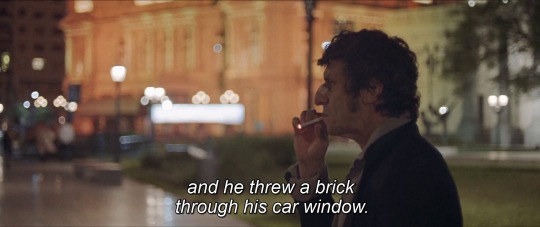




Iniciales SG [Initials SG] (Rania Attieh, Daniel Garcia - 2019)
#Iniciales SG#Initials SG#Rania Attieh#Daniel Garcia#extras#Julianne Nicholson#Diego Peretti#Daniel Fanego#probation#Serge Gainsbourg#películas argntinas#cine latinoamericano#Cinema de la Argentina#Malena Sánchez#anger#frustration#Buenos Aires#Argentine#2010s cinema#subte#obsession
60 notes
·
View notes
Text
Akelarre (2020)
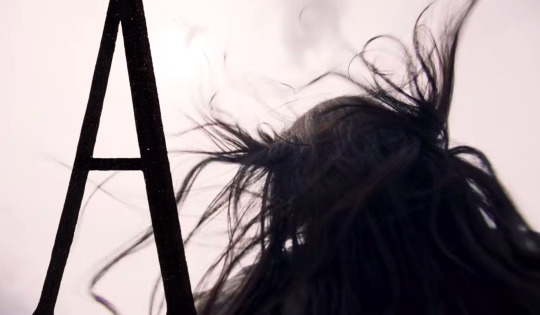
Director: Pablo Aguero
Writers: Pablo Aguero; Katell Guillou
Producers: Fred Premel; Iker Ganuza; Koldo Zuazua
Notable Cast: Amaia Aberasturi; Alex Brendermuhl; Daniel Fanego; Garazi Urkola
Run Time: 90 minutes
Languages: Spanish; Basque
Restrictions: 16 for sexual violence
Genre: Period drama
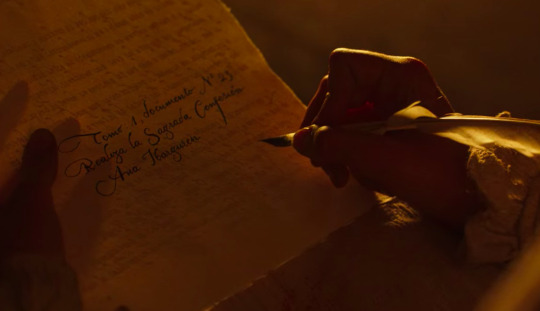
Akelarre pulled me in, ripped my heart out and put it back just to do it all over again. It is a story about six girls accused of witchcraft in 1609 and their bravery and cunning which they utilise to save themselves from being burned at the stake. But do they save their lives?
The film ends on a very literal cliffhanger - the girls, lead by Ana (Amaia Aberasturi) leap off a cliff into the ocean after being chased and surrounded by the Spanish royal guard.
I have so little words to say about this movie because nothing I write will have any chance of doing it justice. Never before have I been interested in films about witchcraft and the witch trials because they all seem too wrapped up in the mystical, spiritual darkness of it all to the point where most of the films forget the events happened. Real men and women were burned for their knowledge or physical appearance. What I equate Akelarre most to is Robert Egger’s 2015 film, ‘The VVitch”. With a 20 year gap of the period - Akelarre in 1609 and The VVitch in the 1630s - both still have very similar feelings about them. The camera direction, colour palette and tone are all so similar, but I think Akelarre deals with the events it portrays with far more empathy to the history.
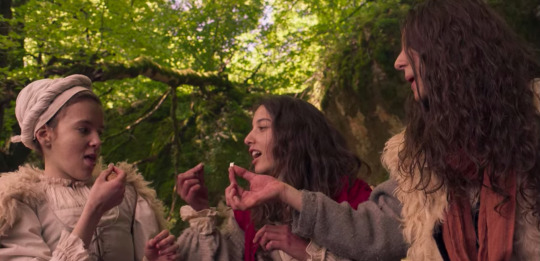
Specifically with this, I want to draw attention to the rituals displayed in both. The VVitch draws a lot of attention to Satan as ‘Black Philip’ and at the end of the film there is a supernatural bonfire scene wherein a group of naked women elevate into the air. I’m not here to say that scene, or, indeed the whole film, is bad, but it is a good starting point in the discussion for Akelarre’s ‘ritual scene’.
Akelarre tells and shows its ritual while Ana is being interrogated by the judge Rostegui (Alex Brendermuhl). Hoping to save her sister and her friends, Ana weavers a story made of truths of a happy memory and embellished lies to give Rostegui what he wants. And I think the description is my second favourite scene in this film. The audience gets to see the memory Ana is drawing her story from and hear the tale she is recounting to Rostegui at the same time. The audience hears her claim she turned her sister Maria (Yune Nogueiras) into a lamb which is shown as her putting on a lambskin jerkin. She claims to create illusions with smoke, which is shown as her and the rest of the girls sharing a pipe in a clearing. The very description she gives of Lucifer she takes from Rostegui himself, adoring the devil with the judge’s beard and light eyes. During the whole account I was enraptured as Rostegui himself.
Rostegui is so, pardon the pun, bewitched by Ana’s account that he has to see it for himself. He goes so far as to postpone the executions of the girls... until he is informed that the full moon when the girls want to ‘perform the ritual’ is the same day all their fathers and brothers get back from sea and might cause issues for the men. So Rostegui takes matters into his own hands and, using the descriptions told to him by Ana, tries to recreate the Sabbath ritual she was so detailed about. Rostegui is suffering both from the witch mania and his desire for Ana and this culminates in a scene that is nothing short of epic.
Personally, this is made all the better by not having a singe supernatural event occur. It felt more like a traditional pagan high-energy ritual than the supernatural, fantastical display in The VVitch. Everything is dark outside the circle created and inside is bathed in a heavy orange glow from the fire. Even thought the girls have been shackled by the guards for added protection, the magic is still there. And this is a magic that exists in our world as we know it. The girls feast and sing and dance. They create an infectious energy around them through nothing but their joy. This infects Rostegui to the point where the girls are even able to leave the fray they’ve created and escape.
This is the cliffside ending. The moon is full, the tide is meant to be high. The girls leap in the sea. Is the audience meant to hold out hope for them? Do the sailors save them? Do they die? My breath caught in my throat to witness it and it would not have had the same power if the ending was resolved.
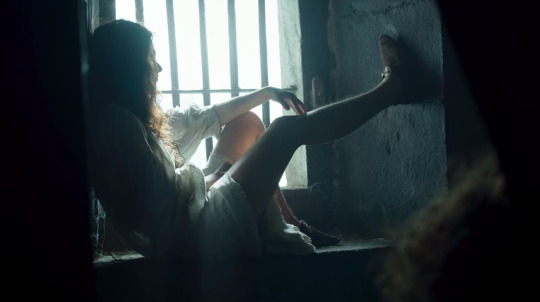
I am still in shock from this film. Everything from the plot to the characters to the costumes. And every frame looks like a Baroque painting. The play of texture, of light and shadow, of colour and absence... my jaw was on the floor the entire time. My notes for this post were so spares because I couldn’t bring myself to look away from the screen. Very few films in my life have had the power to so subtly wrap me in their world. One cannot sit with Akelarre without being transported to the universe it depicts. The screen is a thin veil of speration between the viewer and the characters. When the girls are tortured for information, their pain is tangible. When they run and leap and dance through the forest, sunlight and salt air plays on your skin just as much as it does theirs.
All of this is down to the sheer level of empathy to the plight of these women that I mentioned earlier. Perhaps it was a bit unfair comparing this period piece to a 2015 horror, but again, I also don’t think genre is a reason for a lack of empathy. This movie never made that mistake. Each actress was so chosen that they became the embodiment of all their character stood for. The gentleness of the acting and the masterful directing meant everything was played just enough for it to hit the audience in the gut like a freight train without allowing for any preparation. I am sure that this is a film which delivers some new, unique tidbit after each individual watch.
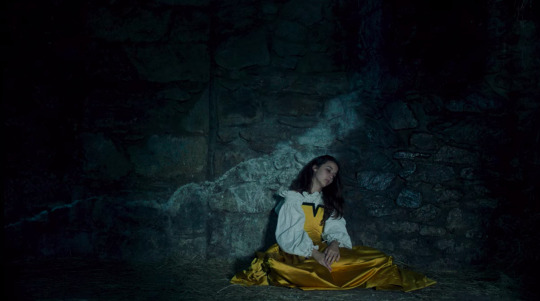
Akelarre is nothing short of a masterpiece that most certainly will have its place in the history of film for a long time coming. If not in all history, then at least in mine. As the credits rolled I had to forcibly crawl my way back to the real world and shake off the enchantment this left me with.
This will be one of my highest recommended films of all time: 9/10.
#akelarre#akelarre film#2020 movies#period drama#1600 movies#spanish movie#basque movie#pablo aguero#amaia aberasturi#alex brendermuhl#daniel fanego#garazi urkola#witch movies#coven#akelarre review#my review#full moon films#top films
28 notes
·
View notes
Text

“Todos Tenemos un Plan”
directed by Ana Piterbarg
2 notes
·
View notes
Photo

El Ángel sieht zwar ganz niedlich und leidlich unschuldig aus, hat aber keinen rechten Sinn für Privateigentum, was vielleicht noch in Ordnung gegangen wäre, aber auch die verstörende Angewohnheit, gelegentlich irgendwelche Leute zu erschießen. Möglicherweise, weil er sexuell etwas verwirrt ist. Das kann nicht gut gehen. Alles ist genau so passiert.
#El Ángel#Lorenzo Ferro#Chino Darín#Mercedes Morán#Daniel Fanego#Cecilia Roth#Film gesehen#Luis Ortega
13 notes
·
View notes
Photo










El ángel (Luis Ortega, 2018)
#el ángel#luis ortega#lorenzo ferro#cecilia roth#malena villa#chino darin#luis gnecco#daniel fanego#mercedes morán#movies#cine#cinema#argentina
23 notes
·
View notes
Photo

Films seen in 2019
# 76 - El Ángel (Luis Ortega, 2018)
#el ángel#luis ortega#lorenzo ferro#chino darín#daniel farego#cecilia roth#luis gnecco#daniel fanego#film#films in 2019#movie#cadwalladery#films seen in 2019#the angel
30 notes
·
View notes
Photo


El Angel (2018, dir. Luis Ortega)
17 notes
·
View notes
Text
Toto Ferro como Regina George
#toto ferro#luis ortega#peter lanzani#carlos robledo puch#chino darin#malena villa#mercedes morán#daniel fanego#ursula corbero#ursula corberó icons#el angel#mean girls#regina george
16 notes
·
View notes
Photo

導演Luis Ortega把《天使怎麼了》拍的流暢好看,幽默又性感,電影插曲選得超棒。 完整文章:http://mypaper.pchome.com.tw/hatsocks75/post/1376874169
2 notes
·
View notes
Photo

The Accused (Acusada), Gonzalo Tobal (2018)
#Gonzalo Tobal#Ulises Porra#Lali Espósito#Leonardo Sbaraglia#Inés Estévez#Daniel Fanego#Gerardo Romano#Gael García Bernal#Martina Campos#Ana Garibaldi#Margarita Molfino#Lautaro Rodríguez#Emilio Vodanovich#Fernando Lockett#Alejandro Carrillo Penovi#2018
1 note
·
View note
Text
Il sabba
Il sabba (Akelarre) è un film thriller spagnolo del 2020 diretto da Pablo Agüero e co-scritto con Katell Guillou e racconta sulla stregoneria come rappresentazione dei tabù e repressione del senso ludico della vita. Tra i protagonisti troviamo Àlex Brendemühl, Amaia Aberasturi, Daniel Chamorro, Daniel Fanego, Iñigo de la Iglesia e Asier Oruesagasti. Il film è disponibile in streaming su Netflix…

View On WordPress
#Alex Brendemühl#Amaia Aberasturi#Asier Oruesagasti#Daniel Chamorro#Daniel Fanego#Iñigo de la Iglesia#Pablo Agüero#Yune Nogueiras
0 notes
Photo


Eva no duerme [Eva Doesn't Sleep] (Pablo Agüero - 2015)
#Eva no duerme#Eva Doesn't Sleep#Pablo Agüero#Argentina#Gael García Bernal#Denis Lavant#Daniel Fanego#Imanol Arias#Sofía Brito#Nicolas Goldschmidt#Sabrina Machi#Ailín Salas#Eva Perón#Pedro Eugenio Aramburu#Emilio Eduardo Massera#experimental cinema#América Latina#Latin America#Historia de America Latina#golpe de Estado en Argentina
18 notes
·
View notes
Text
El Angel (2018)

DESCARGAR PELÍCULA DESDE MEGA
Director: Luis Ortega
La séptima película del realizador de «Caja negra» cuenta la historia del mítico ladrón y asesino Carlos Robledo Puch que aterrorizó a la Argentina a principios de los ’70 con sus salvajes y brutales asesinatos. Chino Darín, Mercedes Morán, Daniel Fanego, Cecilia Roth y Peter Lanzani acompañan al debutante Lorenzo Ferro en este potente thriller sobre un criminal tan incomprensible como cautivante.
3 notes
·
View notes